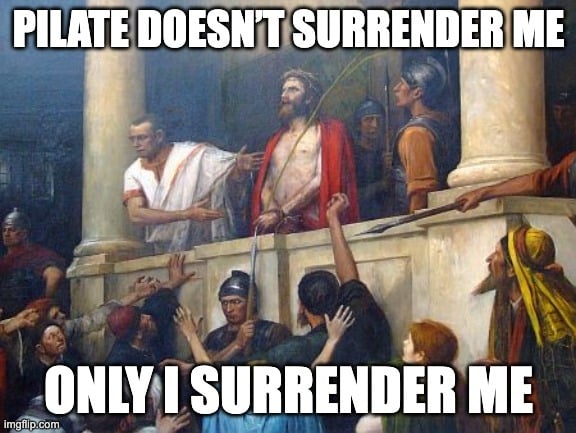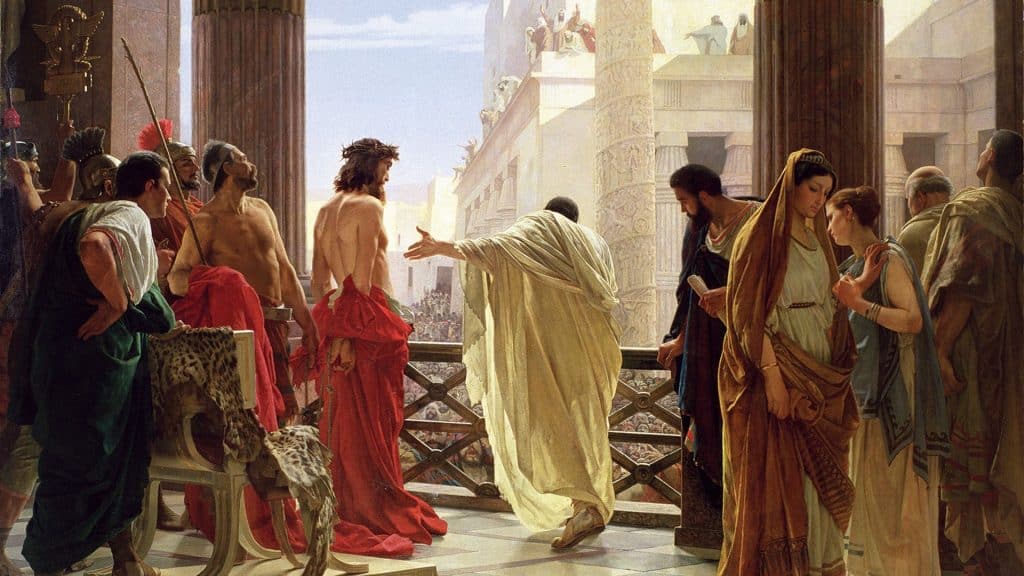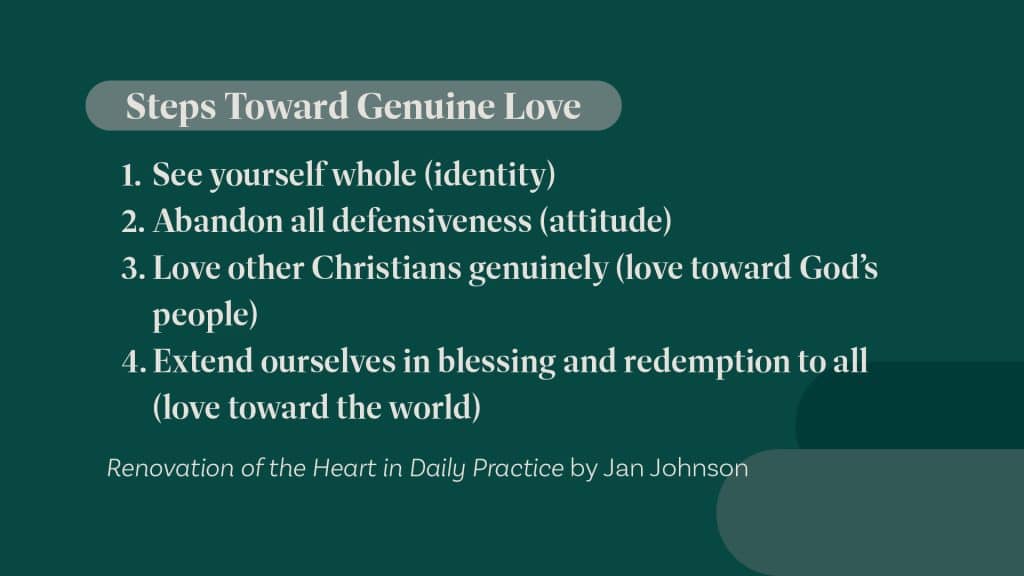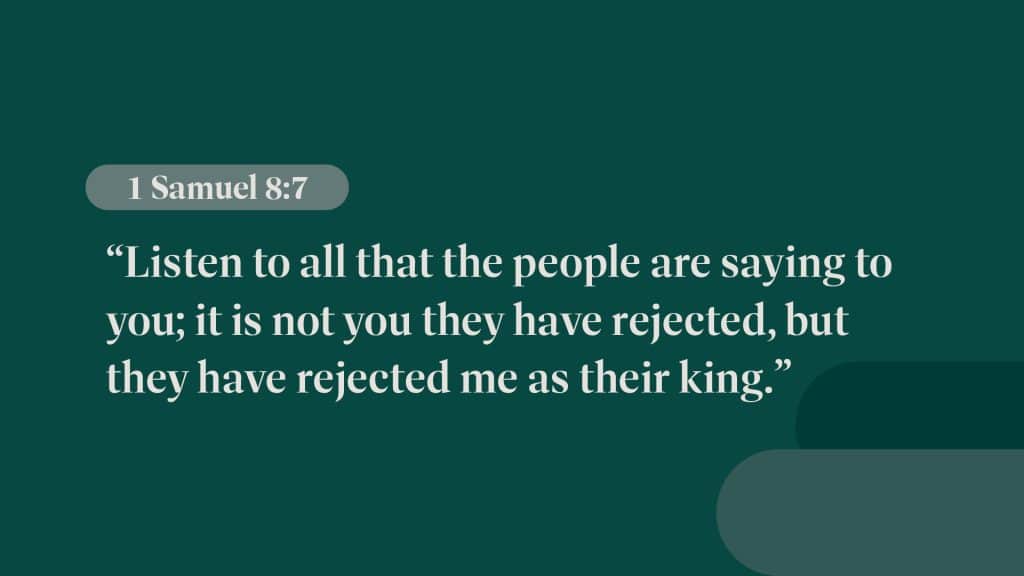Our full surrender to God is only possible when we look at the life and heart of Jesus, whose heart was fully surrendered to the love of God, the Father.
The following is a manuscript adapted from a sermon preached by Chad Harrington at Harpeth Christian Church in Franklin, Tennessee, on March 19, 2023.
Today’s message is from Luke 22:63–23:25 about Jesus’ trial before Herod and Pilate. The text reads (NIV, 1984):
The men who were guarding Jesus began mocking and beating him. They blindfolded him and demanded, “Prophesy! Who hit you?” And they said many other insulting things to him.
At daybreak the council of the elders of the people, both the chief priests and teachers of the law, met together, and Jesus was led before them. “If you are the Christ,’” they said, “tell us.”
Jesus answered, “If I tell you, you will not believe me, and if I asked you, you would not answer. But from now on, the Son of Man will be seated at the right hand of the mighty God.”
They all asked, “Are you then the Son of God?”
He replied, “You are right in saying I am.”
Then they said, “Why do we need any more testimony? We have heard it from his own lips.”
Then the whole assembly rose and led him off to Pilate. And they began to accuse him, saying, “We have found this man subverting our nation. He opposes payment of taxes to Caesar and claims to be Christ, a king.”
So Pilate asked Jesus, “Are you the king of the Jews?”
“Yes, it is as you say,” Jesus replied.
Then Pilate announced to the chief priests and the crowd, “I find no basis for a charge against this man.”
But they insisted, “He stirs up the people all over Judea by his teaching. He started in Galilee and has come all the way here.”
On hearing this, Pilate asked if the man was a Galilean. When he learned that Jesus was under Herod’s jurisdiction, he sent him to Herod, who was also in Jerusalem at that time.
When Herod saw Jesus, he was greatly pleased, because for a long time he had been wanting to see him. From what he had heard about him, he hoped to see him perform some miracle. He plied him with many questions, but Jesus gave him no answer. The chief priests and the teachers of the law were standing there, vehemently accusing him. Then Herod and his soldiers ridiculed and mocked him. Dressing him in an elegant robe, they sent him back to Pilate. That day Herod and Pilate became friends—before this they had been enemies.
Pilate called together the chief priests, the rulers and the people, and said to them, “You brought me this man as one who was inciting the people to rebellion. I have examined him in your presence and have found no basis for your charges against him. Neither has Herod, for he sent him back to us; as you can see, he has done nothing to deserve death. Therefore, I will punish him and then release him.’”
With one voice they cried out, “Away with this man! Release Barabbas to us!” (Barabbas had been thrown into prison for an insurrection in the city, and for murder.)
Wanting to release Jesus, Pilate appealed to them again. But they kept shouting, “Crucify him! Crucify him!”
For the third time he spoke to them: “Why? What crime has this man committed? I have found in him no grounds for the death penalty. Therefore I will have him punished and then release him.”
But with loud shouts they insistently demanded that he be crucified, and their shouts prevailed. So Pilate decided to grant their demand. He released the man who had been thrown into prison for insurrection and murder, the one they asked for, and surrendered Jesus to their will.
The Heart of Jesus
Iam captured in this passage by the heart of God through Jesus. Jesus is so unlike the rest of the world. It’s remarkable. Just think about what he did in this scene in this moment, in this series of trials, mockery, and accusations.
What is it that made Jesus tick?
Jesus was immovable.
Think about this:
- The guards mocked and beat and insulted him (22:63–65). And that was just the beginning of the night.
- The elders of the people—chief priests and teachers of the law—rejected him (22:71).
- The elders falsely accused him in front of Pilate and vehemently accused him in front of Herod (23:2 and 23:10).
- Herod and his soldiers ridiculed and mocked him, dressing him in a robe (23:11).
- The mob sentenced him to death (23:25).
And Jesus stood there.
Nothing from Jesus—except gospel. He just told them who he was. Those are the only words from the lips of Jesus. During what was the most humiliating and humbling thing a human could experience, especially the Messiah of God, he stood there and said, in not so many words:
- “I am the Son of Man.”
- “I am the Son of God.”
- “I am the Christ.”
The Jews and the Romans all, technically speaking, confessed these things, and Jesus affirmed them by saying, “It is as you say.”
That’s it—that’s all he said. No defensiveness, just gospel.
In our culture today a big question that people are asking right now is, “What is the gospel?”
I just want to say it simply and plainly for all of us, Christian and non-Christian alike among us today:
The gospel is that Jesus is King.
What does that mean that Jesus is King? Oh, it means a whole lot, but the absolute irreducible minimum of the gospel is that Jesus is King. And those are the only words spoken and affirmed that night—the same confession, said in three different ways.
That would make sense to all the people: He is in fact God’s chosen Messiah. It’s like he was saying, “Call me Son of God; call me Son of Man” (which is a reference to Daniel 7:13, where it says that there will be one like a “son of man,” who will receive global dominion and power); call me Christ. Yes, that’s me. And he says: “From now on, the Son of Man [me!] will be seated at the right hand of the mighty God” (Luke 22:69). Those were words to incite, but not to violence as we’ll see.
Surrender.
What made Jesus tick?
Why would he surrender himself to the will of the people, let alone to a Roman governor, who “surrendered Jesus to their will” (Luke 23:25). Surrendered the Messiah? Pilate surrendered the Son of God?
We all know that there’s a little bit of irony in this moment, isn’t there? You can’t surrender the Son of God; he surrendered himself to you!
I let my humor get the best of me. I thought of a Chuck Norris joke when I read this. Maybe it was just when I was in high school, but I think they’re still funny:

My favorite one, though is: “Chuck Norris doesn’t sleep; he waits.”
For those who appreciate Dodgeball: “No one makes me bleed my own blood.”
With Jesus here, it’s: “Pilate doesn’t surrender me; only I surrender me.”

All joking aside, this important moment truly is not Pilate surrendering Jesus.
Pilate is the mechanism through which Jesus surrendered himself.
Not just to the will of the people in that moment, but ultimately to the will of God, the Father.
Last week, we looked at the eyes of Christ, and we let his eyes look at us through the story of the authentic discipleship journey of Peter.
Today, all I want to do is meditate with you on the very heart of Christ that surrendered and gave all.
Will you do that with me this morning?
Jesus’ Heart Was Surrendered

Artist: Antonio Ciseri (1821–1891): “Ecce Homo” (“Behold the Man!”); date: between circa 1860 and circa 1880; medium: oil on canvas
We see this painting from about 150 years ago, an oil painting of Pilate presenting Jesus to the people. What’s interesting is Pilate didn’t want to surrender Jesus. It was the people’s will that prevailed.
As we look at this painting to remember the heart of Christ, let me ask:
- Why did he surrender himself? He could have called down the angels.
- Why did he just stand there?
- If he henceforth is seated at the right hand of the mighty God, why did he let them mock him physically and beat him?
Oh, king of the Jews! Let’s put a crown on him. Then, we’ll see what the king of the Jews does at that point.
Oh yeah, God’s chosen … mmhmm, sure.
Jesus’ heart was surrendered to the will of the Father.
What was it about Jesus that made him not say anything? Except the gospel. Why didn’t he try and run? I know I would have been tempted to run.
Jesus was surrendered at a heart level.
It wasn’t that he got caught; he surrendered himself. It was because he was surrendered at a heart level from the very beginning. He knew exactly what God was calling him to do.
Remember in Luke 22:42 from last Sunday: “Father, if you decide to take this cup from me; yet not my will, but yours be done.”
The reason that Jesus surrendered to Pilate, who surrendered him to the people, was because he had surrendered his heart to the will of the Father. He knew exactly who he was and he knew exactly what God had called him to do. He had clarity on his identity and he had clarity on his calling. This was no accident. He was fully surrendered to the will of the Father.
As we think about who we are as people—and Jesus was fully a human—there’s certain aspects to who we are. What I’d like us to think about as we consider the heart of Christ is that the heart of Christ is like our heart. It’s like our will.
In Scripture, heart and will are essentially the same.
[Resource] See Chad Harrington teach on the subject of the heart and the will in his open-access “Spiritual Formation” class [instant, free access here]. See Class 2, “How Spiritual Formation Works.”
The heart of Christ is the same as ours in the sense that it’s the very center of our person. It’s the CEO of who we are; it’s the decision maker; it’s the very core of who Jesus is.
The will, the heart of Christ, was his core person. And at his very core, he was fully surrendered to the very core of who God the Father is. And Jesus knew:
The only way forward Jesus knew was through the cross.
The very core of Jesus’ heart was an understanding of who he was and what he was called to do.
The ladies in our church are going through a book by Jan Johnson, coauthored with Dallas Willard, called Renovation of the Heart in Daily Practice.
I want to share something with you from that book that I think is helpful for understanding how sanctification of the heart works.
First, let’s understand that Jesus is the only totally sanctified person. He had no sin in him, no deceit; he was completely whole. But we can look at his trajectory and what Jan Johnson calls “Steps Toward Genuine Love.”

As the will of a person is transformed, their mind is consumed with the thoughts of God and not the thoughts of man; their body is transformed—addictions, bodily habits of sin, even bodily impulses to sin—these can be sanctified in Christ.
Sanctification works from the inside-out.
You’ve heard that before, but this is actually the anatomy of sanctification, of authentication in Christ. And the inside-out trajectory doesn’t stop at you. It doesn’t stop at Christ’s fingertips, but it extends into the world. And here’s what it looks like as God’s work in our lives extends into the world.
1. See yourself whole.
This is about identity.
First of all, on this path, you must see yourself as whole: You don’t need other people (in the negative sense). In order to be a force for redemption in the world, you are whole in and of yourself. Jesus was whole and knew exactly who he was in God, the Father. His identity was secure.
2. Abandon all defensiveness.
This is about attitude.
Second is that you abandon all defensiveness. Johnson and Willard were not connecting this chapter to the trial of Jesus. So it’s interesting to see how his identity and his lack of all defensiveness pervaded in this passage. His attitude was that of God, the Father.
3. Love other Christians genuinely.
This is about love toward God’s people.
Third is a love of other Christians, genuinely loving God’s people. It can be pretty simple to love God’s people, in some sense, and this is good. And we see that Jesus loved the very people who mocked him as king of the Jews. He loved the Jews in the first century who were at the time known as the people of God. But it doesn’t stop there.
4. Extend ourselves in blessing and redemption to all.
This is about love toward the world.
Here’s what I want to say to us this morning: Jesus’ heart was surrendered to the heart of the Father. But why?
- What was it in the will of the Father that consumed the will of the Son to surrender to the will of the people?
- What was it that made his heart beat?
- What was it that made him control himself and endure suffering unimaginable for our sake?

Here’s what I want to say: It was love, undying, unadulterated, and uncontainable love for you.
Jesus’ heart was full to the brim and overflowing with the love of God.
And that’s why he surrendered himself to the will of the people.
God’s Plan Going Back to 1 Samuel 8
What’s so interesting here is that this heart of the Father was not new with this scene from Luke 23. If you go back with me to the beginning of Israel’s rejection of God as king, when Israel originally asked for a human king, we see this very love of God that captivates the hearts of those who will listen.
Read with me from 1 Samuel 8:4–9:
So all the elders of Israel gathered together and came to Samuel at Ramah. They said to him, “You are old, and your sons do not walk in your ways; now appoint a king to lead us, such as all the other nations have.”
But when they said, “Give us a king to lead us,” this displeased Samuel; so he prayed to the LORD. And the LORD told him: “Listen to all that the people are saying to you; it is not you they have rejected, but they have rejected me as their king. As they have done from the day I brought them up out of Egypt until this day, forsaking me and serving other gods, so they are doing to you. Now listen to them; but warn them solemnly and let them know what the king who will reign over them will do.”

1 Samuel 8:19–22 continues:
But the people refused to listen to Samuel. “No!” they said. “We want a king over us. Then we will be like all the other nations, with a king to lead us and to go out before us and fight our battles.”
When Samuel heard all that the people said, he repeated it before the LORD. The LORD answered, “Listen to them and give them a king.”
Does this sound familiar?
“No!” they said, “We want a king over us.” They didn’t just want a king; they didn’t want God’s kind of kingship, and they were rejecting God’s kingship. They wanted to be like all the other nations “with a king that will lead us and go out before us and fight our battles.”
And God says, “Alright, here you go.”
The heart of Jesus that was surrendered to the will of the people who wanted to reject him as king came from the heart of the Father, who felt this way from the beginning of Israel, when he rescued them from Egypt. That was the beginning of the nation of the people of God, and they were already rejecting God as king.
Jesus comes to Israel representing the heart of the Father and says, “I know they’re rejecting me as king.” And he says, shockingly, “Let them have their way.”
But God, these are your people! This is your only plan. You’re not gonna redo the covenant are you? No, I’m not going to start over in the same way that I began. But God, Jesus is your Plan A, and this is not going well! Crucifixion—that’s for rebels. That’s for insurrectionists. That’s not for the Messiah.
Their shouts prevailed:
Crucify him, crucify him!
See, Jesus knew that he was predestined to be condemned by Herod and Pilate. And that’s actually what we see in Acts 4:27–28:
Indeed Herod and Pontius Pilate met together with the Gentiles and the people of Israel in this city to conspire against your holy servant Jesus, whom you anointed. They did what your power and will had decided beforehand should happen.
God actually decided beforehand that Herod and Pilate with the people would conspire against Jesus. Now, I don’t understand that mystery, but we know that Jesus knew that it was his destiny. Even Pilate didn’t have true power over him. He says “You would have no power over me if it were not given to you from above” (John 19:11).
Jesus always knew that he would be rejected as king, but he also knew that he would be enthroned as king, as well—whether or not the people saw it in the moment.
The elders of the people are the ones who are rejecting God.
Speed of the leader, speed of the pack.
This is true in our country, in our churches, and in our families—leadership matters. And when the leaders reject someone, the whole group does, and that’s what’s happening here.
So in both cases—both 1 Samuel 8 and in Luke 23—we see:
- There’s a choice between a tyrant and God.
- There’s a moment where God’s given a choice to forcefully lead or surrender to their will.
- The people refuse to listen, and their will wins the day.
In each case, there’s a choice between a tyrannical, violent insurrectionist kind of leader, and God. Between a utilitarian—an “I’ll use you for my own selfish gains” kind of leader—and God. Between a nationalist—the Jews, the people of God, are better than all the other people—and God, who wants all nations and all men and all women to be saved.
Our Surrendered Hearts
We know how important it is for our children to freely choose love, don’t we? I only have two kids, plus one on the way. But oh, man, what I want more than anything is when I come down the stairs from my working-at-home office and I hear “Daddy, Daddy” out of the free will and the spontaneous love of my child toward me. And oh, it’s so precious!
When I hear a “Daddy, Daddy” that only comes through freedom in the heart—there’s nothing sweeter to my ears as a father!
God knows that conversion, not coercion, is the only thing that produces a people who will love back.
This unveils five truths about surrender.
1. Surrender must be freely chosen. Why was the heart of Jesus surrendered to the heart of the Father? Because he wants our heart to surrender willingly to his heart, because he wants a relationship of genuine love with all of his people. He was totally surrendered because he knew life was from the Father and he wanted life for the world!
Unfortunately, though, our hearts are often unyielding.
In contrast with the very heart of Christ, who has been our meditation this morning, our hearts apart from Christ are unyielding.
Have you been captured by his love?
Has his heart allured your heart to also surrender all?
It’s kind of interesting, the grace of God:
- He’ll receive us with all of our mess.
- He’ll receive us with all of our supposed righteousness.
- He’ll receive us anyway.
But ultimately, he’s going to call you all in. So it’s really interesting that he:
- Lets us come halfway to start
- Lets us sort of meet him where we’re at
- Lets us sort of give him what we think we’ve got
And then he waits.
2. Surrender gives all. In the heart of Jesus, we see that surrender must be freely chosen, but also surrender gives all. Jesus shows us that.
There’s this thing called the cold plunge. It’s this ridiculous scenario where you get a bath of ice water between 38–60 degrees, and you submerge your entire body in this body of water and let yourself freeze for a little bit. People like Joe Rogan do it, and other wild, untamed people.
Don’t try this at home, but sometimes for 10, 15, even 20 minutes, people do this! It’s unbelievably frigid. You actually can risk hypothermia doing it. But what’s interesting is it’s a mental exercise of control of your autonomic sensory processes, where you can literally control your heartbeat. It reduces inflammation and does all these sorts of things.
You can’t dip your toe in the cold plunge.
You gotta go all the way. It’s called surrender.
Tom Cruise, for a recent Mission Impossible movie, learned how to hold his breath for six minutes! He was all the way under the water. You don’t hold your breath for six minutes halfway under water: you’re either all in or not at all.
Surrender gives all, and it goes totally under.
3. Surrender has an object. It’s not giving up; it’s about giving into the right thing:
- It’s finding the sweet spot on the golf club.
- It’s getting the right palm position on the basketball.
- It’s hitting the volleyball at just the right moment with the right part of your hand.
4. Surrender requires trust. If you don’t trust the heart of the Father, you’re not going to surrender to him. We often think about our surrendering to Jesus, but remember Jesus was fully surrendered. He never asks us to do anything he’s not willing to do. And so when “Christ bids a man to come, he bids him come and die,” as Dietrich Bonhoeffer said.
He did the very thing that he was calling us to.
5. Surrender is Jesus’ way of redemption.

Jesus knows, and he preached and he showed and proclaimed, that surrender is God’s way of redemption. There’s no other way.
Everybody wants to go to heaven, but nobody wants to die.
Jesus says, it’s the only way.
So what I want to say to you this morning is that perhaps your rebellion is more subtle.
- My daughter doesn’t like to wear pants when we’re going to walk in the cold; she wants to wear shorts. Well, then she gets to learn the hard way.
- We don’t like to fully rest, even though we know we need to in order to fully honor God—to recharge and to connect with him.
- We don’t go when God calls us to go. We just sit there.
Sometimes our rebellion is subtle.
Sometimes our lack of surrender, our unyielding heart, is latent, and it’s a small part of our life. But Jesus calls us to go all in.
So let’s look at the heart of Christ again.
What was it that caused Jesus to surrender all? This is very important because it’s the exact thing that’s going to cause us to surrender all. Look at this painting with me.

“Who do you think you are?” they ask. And he says, “I am the Son of God sitting at the right hand of the mighty God.” He knew exactly who he was.
Do you know who you are today?
And he knew exactly what he was called to do. Do you know what your calling is? Do you know what your purpose is? Have you embraced your full identity as one totally and unabashedly and completely lavished with the love of God? Do you know yourself? Do you know that theology? Do you know his love? Have you felt it? Have you received it? Have you surrendered to the love of God in the person of Christ Jesus?
Do you know what he’s called you to? He doesn’t just want your attendance and your adherence. He wants all of you.
In Ephesians 2:10, it says, “For we are God’s workmanship, created in Christ Jesus to do good works, which God prepared in advance for us to do.” Just like he prepared the crucifixion in advance for Jesus to do, we’re prepared for good works.
I’m telling you, my children are precious to me. I mean, totally. I would die for them. No question, split-second decision every time. Absolutely.
You are precious to God, precious. He loves you.
Is that how you think of God’s view of you? You are his treasured possession and that’s what makes him a good king. You are called to be so much. You are called to do so much in this world. Have you accepted a lowly calling when you’re called to serve the king of the universe?
Total surrender is what Christ showed us; total surrender is what we’re called to.
Total Surrender to God
Total surrender is what I want to call you to this morning.
Here’s what that means: No area left uncovered. It’s vulnerable to give it all up. I’m sure glad Jesus didn’t surrender most.
It means no room in the house of your heart closed off. Not a closet, not even a drawer. Nothing. Total surrender. No corner, no area of the garage, no crawl space—all surrendered.
Yes. Even that—that thing lingering in your mind. The recurring thought of: Does he mean that? Yes, that too. All of it. Jesus gave it all, and he expects us to give it all. Because if we give it all, then we receive all in return.
Paul prays this in Ephesians 3:17–19:
And I pray that you, being rooted and established in love, may have power, together with all the saints, to grasp how wide and long and high and deep is the love of Christ, and to know this love that surpasses knowledge—that you may be filled to the measure of all the fullness of God.
Do you know his love that’s bigger than you can imagine? The dimensions of God’s love are unsearchable.
Today, I want to call you all in.
God calls us all in.
If you haven’t given it all, today is the day. There’s no reason not to be sure. It’ll be painful. Yeah, Jesus understands that, but it’s so good. It’s way better than the alternative.
So to the Christian, now is the time to give up your way for the way of God. Today. Today.
“Today, if you hear his voice, do not harden your heart,” it says in Hebrew 4:7.
That’s today, not tomorrow. We don’t know that we’ve got tomorrow.
And to those who have not committed their life to Christ for the first time, there’s no better day than today. Today’s the day, and I can guarantee you what will happen. You will be saved by Jesus Christ. He was sure of it. You don’t get crucified for nothing. He wasn’t just playing a role or showing an example. He was doing something real in this universe. He was doing something real for the salvation of the world, and you have the opportunity to be saved today, you have the opportunity to be sanctified.
You have the opportunity to surrender all today. Today can be the day for you.
